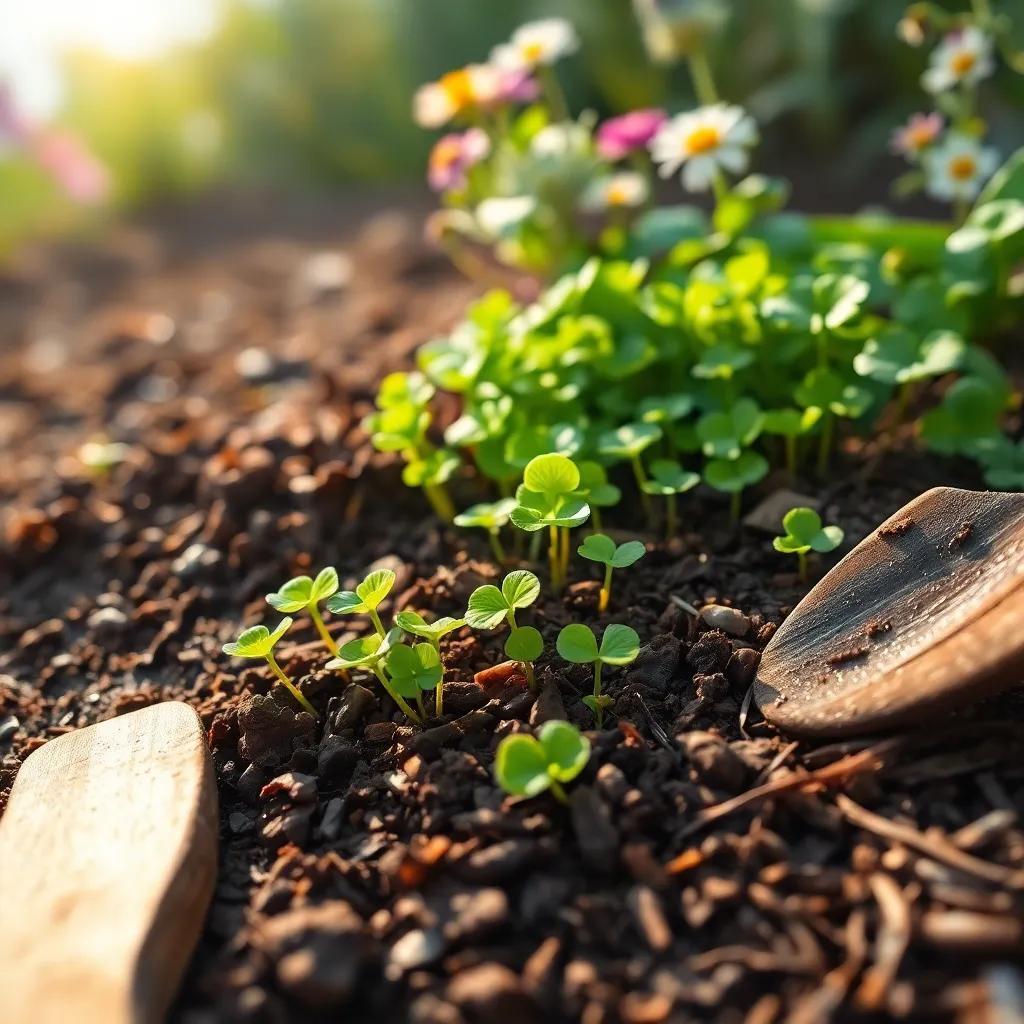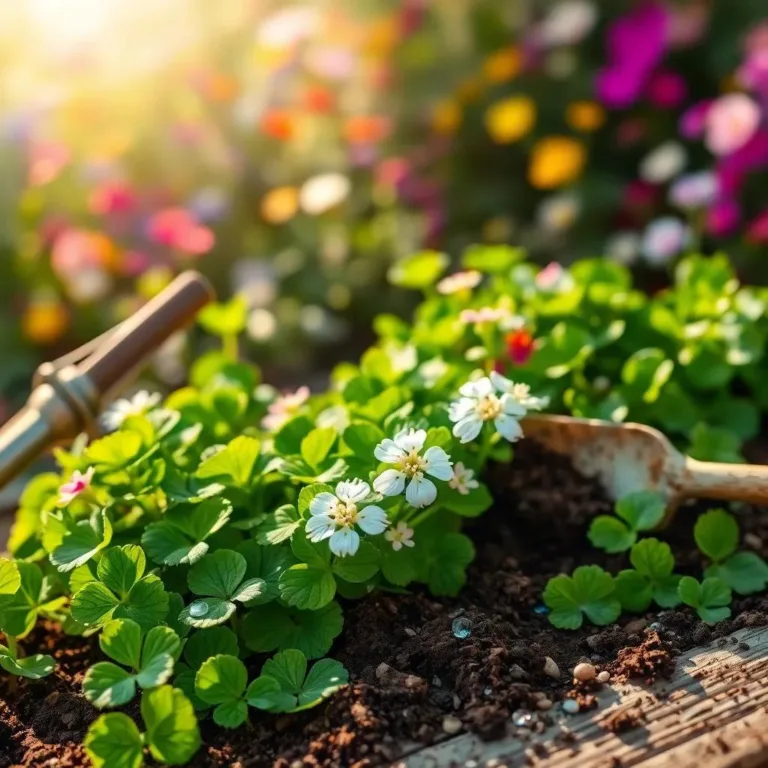Are you ready to grow some fabulous clover in your garden? Whether you’re a gardening newbie or a seasoned pro, understanding how clover seeds germinate can bring your gardening dreams to life! Join me as we explore the ins and outs of clover growth, uncovering the secrets to making those little green wonders sprout happily!
Factors Influencing Clover Germination Time
When I think about growing clover, I can’t help but imagine those lush green patches sprouting up in no time. But wait! Before that happens, let’s chat about the factors that can affect clover germination time. It’s like baking a cake. You need the right ingredients and conditions, or it just won’t rise!
Here are some of the main factors to keep in mind:
- Seed Quality: Just like you want the freshest ingredients for your cake, using high-quality clover seeds is essential! Poor quality seeds can lead to low germination rates. Trust me, I always check for reputable suppliers!
- Temperature: Seeds are pretty picky! Clover seeds thrive in cooler temperatures of 50-70°F (10-21°C). If it’s too hot or too cold, those little seeds might just sit there, looking at you like, “Not yet!” So, timing is everything!
- Moisture: Just like my plants love a good drink, clover seeds need consistent moisture to sprout. But don’t overdo it! Too much water can lead to rot—yikes! So, keep the soil moist, but make sure it’s well-draining!
- Soil Conditions: The conditions of your soil matter too! Clover loves well-draining, nutrient-rich soil. If it’s too compacted or dry, those seeds may find it hard to push through.
- Weed Competition: Weeds are like the unwanted guests at a party. They’ll hog all the resources! Make sure to clear the area before planting clover seeds so they have enough room to grow.
By keeping these factors in mind, you’ll give your clover seeds the best chance to sprout and flourish! Are you ready to create the perfect environment for those little green wonders?
Creating Optimal Conditions for Clover Germination
Now that we’ve covered the important factors, let’s dive into how to create optimal conditions for clover germination! Think of it as setting up a cozy space where your seeds can feel right at home.
Here’s how we can do it:
- Temperature Control: As I mentioned earlier, keeping the temperature in that sweet spot of 50-70°F (10-21°C) is key. If it’s too chilly or too hot, consider planting your seeds at the right season or using a cover to keep them warm.
- Moisture Maintenance: Before planting, make sure the soil is nicely moistened—think of it as preparing a sponge for baking! After planting, keep watering lightly. Remember, we want it moist, not swimming!
- Soil Preparation: It’s like giving your seeds a luxurious bed to grow in! You’ll want to remove any weeds or debris. Mixing in some organic matter, like compost, can really improve the soil’s structure and nutrients. Aim for a pH of 6.0-7.0—this is clover’s happy zone!
- Planting Depth: When planting, aim for a depth of ¼ to ½ inch (0.6-1.3 cm). This way, the seeds can access moisture while being protected from too much light.
- Pest Protection: Don’t forget to protect your seeds from mischievous critters! Birds and other small animals can be a nuisance. Covering the area with netting or using scare tactics can help keep them at bay!
By following these steps, you’ll create the perfect conditions for clover seeds to germinate and grow strong! Get ready to enjoy that beautiful greenery in your garden!

Understanding Variations in Germination Rates
Just like every recipe can have its quirks, the germination rates of clover seeds can vary! So, why do some seeds sprout faster than others? Let’s break it down together!
- Seed Variety: Different types of clover have unique behaviors! Some, like red clover, may sprout faster than others, like white clover. Knowing what variety you’re planting can help you set realistic expectations.
- Seed Quality: This is where quality matters. If you grab seeds that are old or from a questionable source, you might end up waiting longer for those little green shoots. Always check the packaging and choose seeds with high viability!
- Environmental Conditions: Mother Nature can be a bit picky! If the temperatures drop too low or if there’s not enough moisture, germination can lag. Keeping an eye on weather changes can really help here.
- Seed Treatment: Some folks, including me, like to give seeds special treatment before planting! Techniques like scarification (nicking the seeds) or stratification (chilling them) can speed things up. It’s kind of like giving the seeds a little nudge!
- Patience is Key: Sometimes, it just takes time! Seeds don’t always listen to our timelines, and that’s all right. Just remember to keep caring for them, and soon enough, you’ll have a lovely clover patch!
Understanding these variations can help us be ready for whatever surprises might pop up along the way!
Techniques to Promote Faster Clover Germination
Ready to speed things up? Let’s talk about some fun and effective techniques to promote faster clover germination! These tips will help create a welcoming home for your seeds, making them feel right at home.
- Seed Scarification: If your seeds are a bit stubborn, give them a gentle scratch! This helps water get in and jump-starts the germination process. Just be careful not to damage them too much!
- Stratification: Want to mimic winter? Put your seeds in the fridge for a short period before planting. This cold treatment can help some seeds understand it’s time to wake up and grow.
- Planting at the Right Depth: Planting seeds too deep can make them struggle. Aim for that sweet spot of ¼ to ½ inch (0.6-1.3 cm). It’s a cozy spot for them to gather moisture while still being close to the surface!
- Keeping Moisture Levels Just Right: Consistent moisture is a must! Water lightly before and after planting to keep those seeds happy. But avoid overwatering; standing water can be a seed’s worst nightmare!
- Protection from Pests: Use netting or scare tactics to protect your seeds from hungry birds or other critters. You want your clover seeds to feel safe and snug underground!
These techniques can really give your clover seeds a boost, helping them germinate faster and more efficiently! Let’s get those seeds sprouting!
Common Challenges in Clover Seed Germination
Every gardener faces some challenges, but don’t worry! Knowing the common challenges in clover seed germination can prepare us for any bumps in the road.
- Poor Soil Quality: If your soil has too much clay or is too compacted, clover seeds might have a tough time. Improving soil quality with compost or organic matter can give your seeds a better shot!
- Inconsistent Watering: We all forget sometimes, but keeping the soil consistently moist is essential. If you let it dry out too much, seeds can struggle to sprout. I like to keep a watering schedule to help me remember!
- Extreme Temperatures: Too hot or too cold? That can delay germination. Monitoring the weather and adjusting your planting time can help avoid these extremes.
- Weeds and Competition: Weeds are like uninvited guests at a party! They can steal nutrients and water from your clover seeds. Make sure to prepare the area by clearing away any weeds before you plant.
- Pests and Wildlife: Watch out for those sneaky critters! Birds, rabbits, and other pests can cause headaches for gardeners. Protecting your newly planted seeds with barriers can help prevent this problem.
Facing these challenges head-on can make the difference between a thriving clover patch and a frustrating experience. With a little knowledge and preparation, we can tackle these issues together! Happy gardening!

